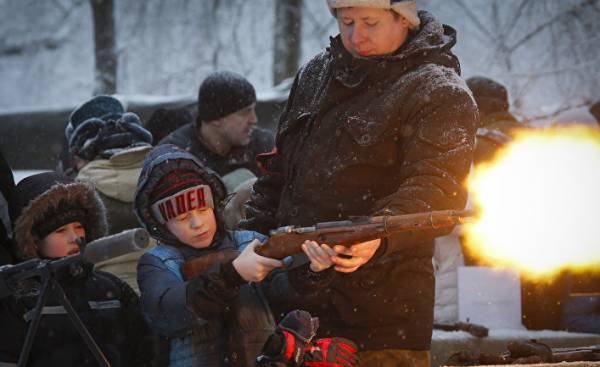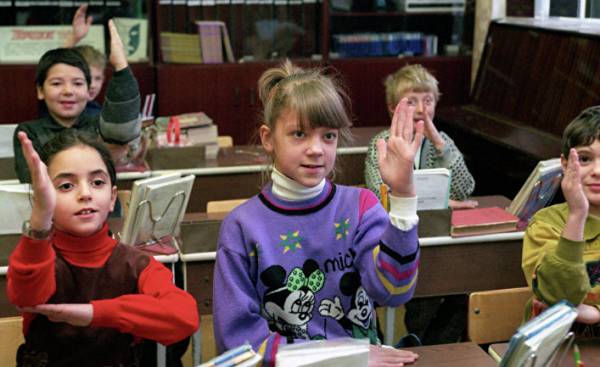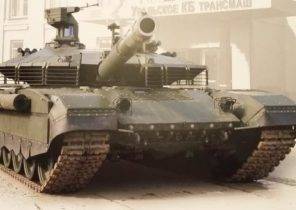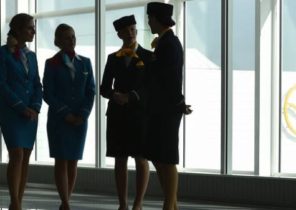
Propaganda militaristic ideas and gender stereotypes in Russia begins with the first stages of the public education system. The celebration of February 23 and March 8 is one example of such a policy.
“Mom, did you know that dad went to war and there they were all killed?” — I asked my four year old daughter Olga.
Olga goes to a regular public kindergarten next to the house in one of the residential areas in the South-West of Moscow. The two-storey building with large Windows, lined with dirty yellow tiles, she spends weekdays from 9 am to 6 PM. In the evening I carefully questioned the daughter about how she spent the day with anyone from children and what to play, what was told to educators. After a year and a half she finally started on her own without my prompting you to talk to me about what’s new she learned in the walls of the kindergarten.
“Dad went to war. Go to war only men, women in the war did not go, but children are not allowed”, — categorically declares Olga.
I’m trying to convince daughter: say go at it, unfortunately, both men and women.
“No! All the teachers know! Women at war don’t go” — not appeased Olya.
I’m lost, can feel boiling anger in teachers and the fear of losing the child’s trust, frantically looking for pictures of grandmother, who passed the Great Patriotic war in the rank of Junior Sergeant of anti-aircraft detachment. Against this evidence, the daughter could not resist and agrees: “teachers are not wrong, they just forgot”.
I sigh of relief that I find it hard to believe that in a country that went to war more than eight thousand women, there is now gendernormative picture of the distribution of professions and the role of women belittled except that abilities to cook and clean the house.
Olya, meanwhile, continues to share new knowledge about the world.
“Mom, the Americans — the enemies.”
“Americans are not enemies. There are good Americans, bad Americans, different Americans can be. There are bad people and good people. Where they live is not important,” I quickly come up with the answer. Fortunately, in my childhood, my grandmother explained all the same simple words.
“But the Americans come to other countries. These bad Americans” — not appeased my daughter.
“Russian, you know, also come to other countries, and also not very well-behaved. In Syria, for example,” a little more and I think I will start a fierce debate with a four year old child.
“Exactly! Syria!” — Olga scares me even more because in its four years, somehow knows about Syria, and, apparently, even aware of the fact that there are fighting Russian soldiers.
“Ah! The Americans are the bad ones that the Chinese people”, — Olga finally gets confused and loses interest in our conversation. She turns on her side and falls asleep.
I find it funny and sad because I don’t understand, why the four-year girl to explain something about the enemy, the USA, China, Syria, a war in which you have to kill? Why would a child of preschool age, this political information in the best Soviet traditions?
The next day I try to ask the teacher if there were children in the group an educational educational work, told them about the enemy-the Americans and the Russians in Syria.
But the tutor admits only that told about the great Patriotic war on the eve of Defender of the Fatherland Day. “And as Americans… don’t know each other, you may recognize,” she waves a hand somewhere in the party room, where children play, and goes to him. And I’m still trying to understand why preschool is so much militarism.
A Kalashnikov for a three-year
In Russia February 23 is a public holiday. During the Soviet Union it was called red Army Day, but after the collapse of the USSR was renamed Defender of the Fatherland Day. After many decades following the establishment of the holiday was lost exclusively military in nature: in this day to congratulate the boys and men, regardless of age and having served any man in the army and how to relate to the idea of military action. While the military entourage of the holiday is preserved: all men are called defenders of the Fatherland.
Trying to vaccinate children in schools and kindergartens love of country, educators often choose a program of celebration on February 23, rich military paraphernalia, and talking about war and soldiers ‘ everyday life as the holiday and fun time.
Room with large Windows on the wall hangs the Russian flag from corner to corner stretched a rag garland with flags and balloons colors of the Russian tricolor. This is a standard decoration of the hall for performances in the usual Russian kindergarten. Under the military March from behind the curtain comes a platoon of Marines — five – and six-year-old boys in the blue berets, vests and trousers. In their hands — a plastic toy Kalashnikovs. Boys in military uniform begin to dance, imitating a drill, then lifting, then dropping the weapon.
Around the stage there are benches with the audience. At the forefront sit five – and six-year-old girls: they wore dresses, the hair is removed with broad bows. In the view of the military as they are not involved in Russia’s military is traditionally considered for men.
“What do you want to be when you grow up?” — asks a five year old girl, dressed in a long sundress in a traditional style, the boy in the striped vest.
“Of course, the military! Will protect the homeland,” answers the boy. After that, the stage runs a group of his companions in the same clothes — vests and berets. A popular song crooner Leonid Agutin “We’re now soldiers” boys dancing.
Initiative
A single compulsory national standard for the conduct of activities related to national holidays in Russia.
The city methodology centre, licensed by the Department of education of the city of Moscow, produces recommendations, which States that celebrate public holidays is desirable. So, in celebration of the day of Defender of the Fatherland can participate parents of soldiers and preparations for International Women’s day might include presents for mom.
But public schools have the right different to the celebrations dedicated to Defender of the Fatherland Day and International Women’s day.
“On February 23 can be learned, courage can invite veterans, on March 8, mostly concerts, invite mothers and women teachers. Every school has certain traditions”, — said Andrey Lukutin, Deputy Director of the City methodological center of the Department of education.
School, he said, chooses the format, not hard regulations. This information was confirmed by two officers working in kindergartens in Moscow and the Moscow region.
 © RIA Novosti, Vladimir Fedorenko | go to fotoannunci one of Moscow secondary schools
© RIA Novosti, Vladimir Fedorenko | go to fotoannunci one of Moscow secondary schools
At the same time, according to the recommendations of the Ministry of education, basic educational program of the school must necessarily be included the program of making disciples, which is able to form a “students’ ideas about basic national values of the Russian society, such as patriotism, family, and morality.”
As recommendations of the Ministry of education perceive Russian officials in local government, evident in the decisions of the departments of education in regions and municipalities. For example, according to the documentation in a Single information system in the sphere of procurement, administration of the Lyuberetsky municipal district of Moscow region allocated 2.6 million rubles for the organization of measures grazhdansko-Patriotic and spiritually-moral education of youth. The list of actions includes the action “Day of draftee” and military-Patriotic game “defender of the Fatherland” paraphernalia in the form of military uniforms. The scenario of the latter, in particular, should include training young people for service in the armed forces.
“There are individual characteristics of children. Some children like to play war, they feel like warriors, fighters, and someone brought up in a family in the pacifist tradition, does not want this to touch. But we must remember that war is a tragedy, grief, misery, murder. If the child perceives the war quietly, then maybe he doesn’t feel or underestimates the pain, — says child psychologist Elena Morozova. — Dressing children in military uniforms — it’s early militarization.”
According to her, the Defender of the Fatherland Day in educational institutions it is better to focus on the fact that it is a holiday defenders, “and the defendant is not only a warrior, he can protect, for example, a girl or principles.” “It is not raised neither courage, nor patriotism. Children should be in their environment, in a more childish fairy — and more kind. It should be a celebration of the power of the spirit, not strength of the fist,” concluded Morozov.
A woman’s place is in the kitchen
There is a calendar of state celebrations and women’s day: it is the 8th of March. Despite the history of this holiday, which appeared in the solidarity of women workers in the struggle for equal rights and emancipation in Russia he acquired a diametrically opposite sense. March 8 women of Russia will receive greetings and wishes to remain “beautiful”, “gentle”, “kind”, remember the typical female gender role “homemaker”, “mother” and “wife.”
In schools and kindergartens is March 8 decided to hold festive concerts, to congratulate mothers and grandmothers. In fact on March 8 in Russia is the equivalent of mother’s Day, which completely replaced the idea of gender equality the semantics of the occasion.
Many children do not understand what they are celebrating: in a typical scenario, the celebration of 8th of March woven and motives congratulations to the women on mother’s day, and announcing the imminent onset of spring, and the motifs of Slavic celebrations.
“I was sitting in the hall before the performance and heard three year olds discuss what it for a holiday. This is the day of birth or maybe day of spring. And then someone shouted: this is the eighth day of the mother!” laughing says the mother of one of the students of the Moscow pre-school institutions.
“On 8 March in kindergarten daughter had to participate in the contest, in which children showed how they help the mother. To sort out the casts of onions, carrots, zucchini and potatoes. They say that the mother we have is the one who cooks. But the fact that I don’t cook! I work all day, prepares a nanny who picks up his daughter from kindergarten. To the question whether she [the daughter] me in the kitchen, she replied, “no.” And the teacher said it was bad. In General, a continuous misunderstanding. Better to be told that onions and carrots — is not the limit women’s opportunities”, — says the resident of Moscow Nina P.
According to psychologist Elena Morozova, it is important that when preparing for a holiday with children talked more, learned what they want to be in the future: “maybe the girls want to be mothers not only giving birth and raising children, but also doctors, teachers or someone else”.
Unfeminine thing
“My daughter says that there are games for boys and for girls. Until she went to kindergarten, she had no idea what to play cars is only for boys. Now, it turns out that girls should play with dolls. Clearly, they are not forced, but the fact that such negotiations are underway and the teachers didn’t say anything, didn’t explain that machines can play everything — it’s alarming,” — complains the inhabitant of Moscow region Natalia A.
To the question, how are the parents of the other children to this gender distinction, she told me that she tried to raise this topic in conversation with other women whose kids go to the same garden and the group, but they did not share her dissatisfaction. “One said: if the children will not tell you what separates the boys from the girls, the boys will grow up gay. And he said that due to the fact that women have become too independent, men become gay because they lack affection”.
According to the study, Institute of education, HSE in cooperation with the European University in Florence, the chance to take leadership positions in women in Russia is 1.4 times higher than in men, including through higher achievements in education. But this advantage the Russians are in no hurry to sell.
According to the authors of the study, the women interfere in Russia to build a career not just a weak support for maternity, and gender stereotypes. Employers are men in high office is much more likely that they do not need to pay parental leave to care for a child. Women face discrimination, lower expectations and don’t aspire to managerial positions. In the end, despite the high level of education, a real chance to build a professional career in women is much less.
After the collapse of the Soviet Union, the inequality of women and men in Russia in the labour market has increased, according to another study, conducted by Dmitry Kurakin, Director of the Center for cultural sociology and anthropology of education, Institute of education, HSE, and Julia Kosyakova, postdoctoral fellow, Institute of employment research in Nuremberg. According to scientists, in the mass consciousness have intensified cultural stereotypes that relegated women the role of “home” wives and mothers, not competent and educated worker.
In the Russian business community has flourished signs of Patriarchal traditionalism, in which a man is considered as breadwinner and woman as homemaker. In increasing gender inequality has contributed such factors as the revival of religious movements, both Christian and Muslim, States the study.
To compete for attention
“Kitty is a girl, and the puppy is a boy. Boys look at girls. In beautiful girls boys fall in love”, — Olya plays in role play with magnets on the fridge while I finished the text, working on weekends from home.
“And scary?” — without detracting from the screen, the routine I asked my daughter.
“In the terrible not only fall in love in beautiful,” like most kids, she loves simple and clear scheme of life, admits of no exceptions, nuances and reflections.
“And in the kindergarten who is the most beautiful girl?”
“Anastasia. All the boys look up, Anastasia” — sadly meets Olga. It seems that the theory of beautiful girls doesn’t seem to her so attractive.
In the evening before going to sleep I’ll spend an hour figuring out that she was told by the kindergarten teachers of the world. So I know that there are rampant facilitation of sexual relationships, an abundance of gender stereotypes, the denial of homosexuality and the belief that it can be avoided with the help of talk about failing boys fall in love with boys, dividing the world into “us” and “them”.
Every night I make sure that it’s getting harder to deal with the propagation of ideological attitudes by the force of parental authority: I have one hour before bedtime. In public educational institutions a child can spend up to 12 hours a day.
Private kindergarten and school — one of the possible ways out of this situation, where parents are more likely to influence the educational process. But this alternative is illusory for the majority of inhabitants of Russia: the private educational institution may reach 80% of the average labor income of a resident of one or another Russian region. So, the monthly fee for a private kindergarten in Moscow ranges from 30 to 50 thousand rubles, and the average labor income, the statements of Moscow officials, is around 62 thousand.
It is hoped that the formation of the worldview of their children two are enough hours in the day and two — at best — a weekend in a week.







